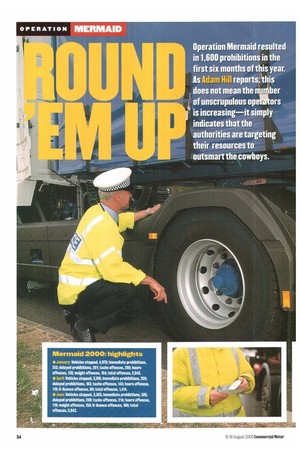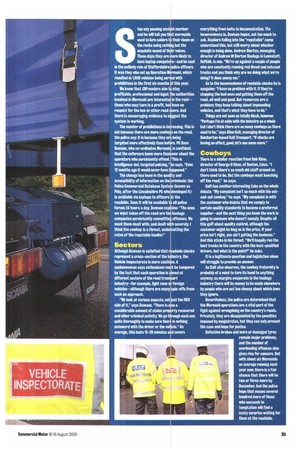Operation Mermaid resulted in 1,600 prohibitions in the first six
Page 36

Page 37

If you've noticed an error in this article please click here to report it so we can fix it.
months of this year. As Adam Hill reportsitliis does not mean the ter of unscrupulous ope ors is increasing—it simply indicates that the authorities are targeting their resources to outsmart the cowboys. Istop any passing ancient mariner and he will tell you that mermaids used to lure sailors to their doom on the rocks using nothing but the exquisite sound of their voices. These days they are more likely to have laptop computers—and be cast in the unlikely role of Staffordshire police officers. It was they who set up Operation Mermaid, which resulted in 1,600 vehicles being served with prohibitions in the first six months of this year.
We know that CM readers aim to stay profitable, professional and legal; the authorities involved in Mermaid are interested in the rest— those who may turn in a profit, but have no respect for the law or other road users. And there is encouraging evidence to suggest the system is working.
The number of prohibitions is increasing. This is not because there are more cowboys on the road, the police say: it is because they are being targeted more effectively than before. PC Dave Dawson, who co-ordinates Mermaid, is confident that the enforcers know more than ever about the operators who persistently offend. "This is intelligence-led, targeted policing," he says. "Even 12 months ago it would never have happened."
The change has been in the quakty and accessibility of information on the criminals: the Police Commercial Database System (known as Pike, after the Lincolnshire PC who developed it) is available via laptops to officers at the roadside. Soon it will be available to all police forces 24 hours a day. Dawson explains: "The ones we want taken off the road are the haulage companies persistently committing offences. We want them dealt with, and dealt with severely. I think the cowboy is a threat, undercutting the rates of the reputable haulier:"
Sectors
Although Dawson is satisfied that roadside checks represent a cross-section of the industry, the Vehicle Inspectorate is more cautious. A spokeswoman says enthusiasm must be tempered by the fact that each operation is aimed at different sectors of the road transport industry—for example, light vans or foreign vehicles—although there are many spin-offs from such an approach.
"We look at various aspects, not just the HGV side of it," says Dawson. "There is also a considerable amount of stolen property recovered and other criminal activity. We go through each one quite thoroughly to make sure there is nothing untoward with the driver or the vehicle." On average, this lasts 15-20 minutes and covers everything from bolts to documentation. The inconvenience is, Dawson hopes, not too much to ask. Hauliers falling into the "reputable' camp understand this, but still worry about whether enough is being done. Andrew Bierton, managing director of Andrew M Bierton Haulage in Lowestoft, Suffolk, is one. Were up against a couple of people who are constantly running red diesel and untaxed trucks and you think why are we doing what were doing? It does annoy me."
As to the inconvenience of roadside checks he is sanguine: "I have no problem with it. If they're stopping the bad ones and getting them off the road, all well and good. But resources are a problem; they keep talking about impounding vehicles, and that's what they have to do."
Things are not seen as totally bleak, however. "Perhaps I'm at odds with the industry as a whole but I don't think there are as many cowboys as there used to be," says Allan Galt, managing director of Dumbarton-based Galt Transport. "If checks are having an effect, good, let's see some more."
Cowboys
There is a similar reaction from Bob Kime, director of George H Kime, of Boston, Lincs. "I don't think there's as much old stuff around as there used to be. But the cowboys want knocking off the road," he says.
Galt has another interesting take on the whole debate. "My complaint isn't so much with the outand-out cowboy," he says. "My complaint is with the customer who insists that we comply to certain quality standards to become a preferred supplier—and the next thing you know the work is going to someone who doesn't comply. Despite all this guff about quality control, although the customer might be king so is the price. If your price isn't right, you ain't getting the business." And this sticks in his throat. "We'll happily run the best trucks in the country with the best-qualified drivers, but what is the point?" he asks.
It is a legitimate question and legislation alone will struggle to provide an answer.
As Galt also observes, the cowboy fraternity is probably of a mind to turn its hand to anything anyway; as margins evaporate in the haulage industry there will be money to be made elsewhere by people who are not too choosy about which laws they ignore.
Nevertheless, the police are determined that the Mermaid operations are a vital part of the fight against wrongdoing on the country's roads. Privately, they are disappointed by the penalties imposed by magistrates, but they can only present the case and hope for justice.
Defective brakes and worn or damaged tyres remain major problems, and the number of overloading offences also gives rise for concern. But with about six Mermaids on average running each year now, there is a fair chance that there will be two or three more by December. And the police hope that means several hundred more of those who succumb to temptation will find a nasty surprise waiting for them at the roadside.








































































































